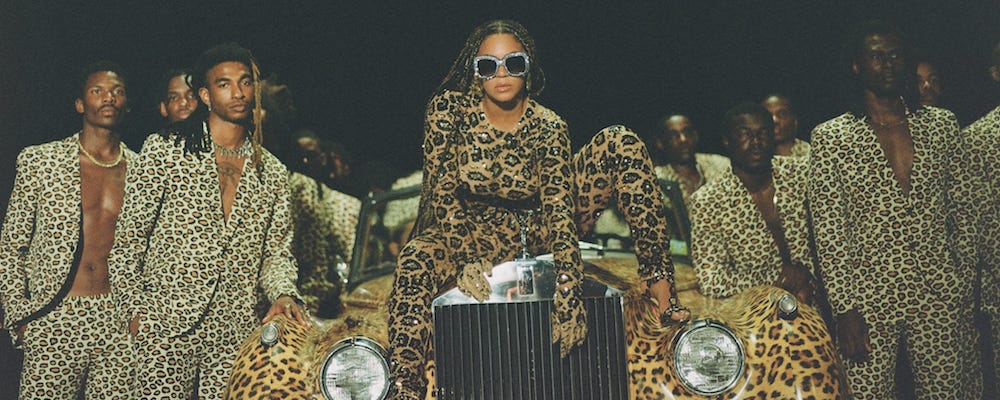Beyoncé’s ‘Black Is King’ Feverishly Celebrates Blackness and Africa’s Cultural Legacy
Alci Rengifo
The world only had to know that Beyoncé had directed a feature length visual album of her 2019 release, “The Lion King: The Gift,” curated for the smash hit Disney film “Lion King,” to pay immediate attention. The visually astounding result, “Black Is King,” streaming exclusively on Disney Plus, will no doubt inspire immediate, wide-ranging discussions.
While written, co-directed, and executively produced by Beyoncé, “Black Is King” is an enormous canvas of sound, colors and rapid-fire editing assembled by a whole team of directors and editors. Yet without a doubt what they are doing is coalescing around the main vision of the star. That vision is essentially a celebration of Blackness as music, aesthetic and life, all grounded in African roots. The soundtrack features nods to African sounds both classic and modern, and provides an immersive soundscape to the images conjured. Disney’s photorealistic remake of “The Lion King,” which featured Beyoncé in the role of Nala, celebrated Africa and Blackness with welcome updates to what was more common in the ‘90s. Inspired by her contribution, Beyoncé has now also delivered a film that works as a visual companion to “The Gift,” and as a stream of consciousness art film.
“Black Is King” is pure aesthetic, and is best enjoyed as a visual album. Any dialogue apart from the tracks sampling the film (also taken from “The Gift”), tends to be Beyoncé reciting evocative poetry by British-Somali poet Warsan Shire. Shire’s words were also featured in Beyoncé’s acclaimed 2016 visual album “Lemonade.” While “Lemonade” had very clear themes of infidelity and the Black female experience, “Black Is King” is much more of a free form work. This film could easily be screened at a contemporary art museum. On that level some viewers may enjoy it as a surreal experience filled with celebrations of Black culture in all its forms.
Beyoncé has been a pop culture giant for so long that she knows how to pack into 1 hour and 25 minutes nearly every visual flourish of every music video you have ever seen. This film is a virtual catalogue of eye-popping wardrobe, set design and landscapes. It opens on a basket coursing down a river, evoking the tale of Moses from the Bible. It transitions into the track “Bigger,” set amid breezy sunsets along the sea and mythical African iconography. A boy hurtles through space like a meteor, landing on Earth. Lord Afrixana sports a yellow boa around his neck for “Don’t Jealous Me.” The star’s equally famous beau, Jay-Z, appears for the lavishly decadent “Mood 4 Eva,” sitting behind a glistening card before gliding around a mansion. The song culminates with synchronized swimmers almost rendering tribute to Beyoncé. The most stunning video segment belongs to “Already,” with Shatta Wale and Major Lazer, an exhilarating number with shots evoking classic ‘70s cinema, in particular the films of Senegal’s Djibril Diop Mambéty. The choreography in “My Power,” with Nija, Busiswa, Yemi Alade, Tierra Whack, Moonchild Sanelly and DJ Lag, also builds to an overwhelming crescendo amid seemingly endless walls. The format here switches from clean digital to film jump cuts, seeming to cross eras. “Brown Skin Girl,” with Blue Ivy, Saint Jhn and WizKid, is filmed like an elegant ball of debutantes. Lupita Nyong’o makes an ever so brief, scene-stealing cameo. Another notable cameo here is Beyoncé’s former Destiny’s Child co-headliner Kelly Rowland. “Spirit,” the key track featured in “The Lion King” from “The Gift,” opens as a gospel number that reaches heavenly heights with Beyoncé standing amid a choir, a classic Baptist feeling all around.
With its lush, gritty, and intricate combination of images and music, “Black Is King” succeeds in celebrating the very spirit of a continent’s sounds, visual history, and its connections to Black communities around the world. “Black Is King” was filmed from West and South Africa to Belgium, though the specific nations, like Nigeria or Ghana, are never specified. But a scene set in a working class African neighborhood at night, where we simply sit inside a spinning neon car while others cheer and Beyoncé gives her best badass look at the lens, is a lot of fun. Beyoncé’s voiceovers rarely go beyond inspirational statements like, “follow your light.” Then again, in a world going mad, maybe that’s all some viewers will yearn for when they stream “Black Is King.” It is the images themselves that are loaded with a special power, celebrating Black lives while also emphasizing the power of women, and the equality of genders.
“Black Is King” is not quite Beyoncé’s “Pink Floyd – The Wall,” but is a visually stirring experience for those who love her music enough to watch it all the way through. It celebrates the artistic spirit of culture, and the endlessly diverse facets of Blackness as culture expressed through art. The prime message of “Black Is King” is precisely that, the overall strength and importance of Black identity. In times like these, maybe it is good to just turn down the lights, turn on the screen and let “Black Is King” carry us away.
“Black Is King” begins streaming July 31 on Disney+.

